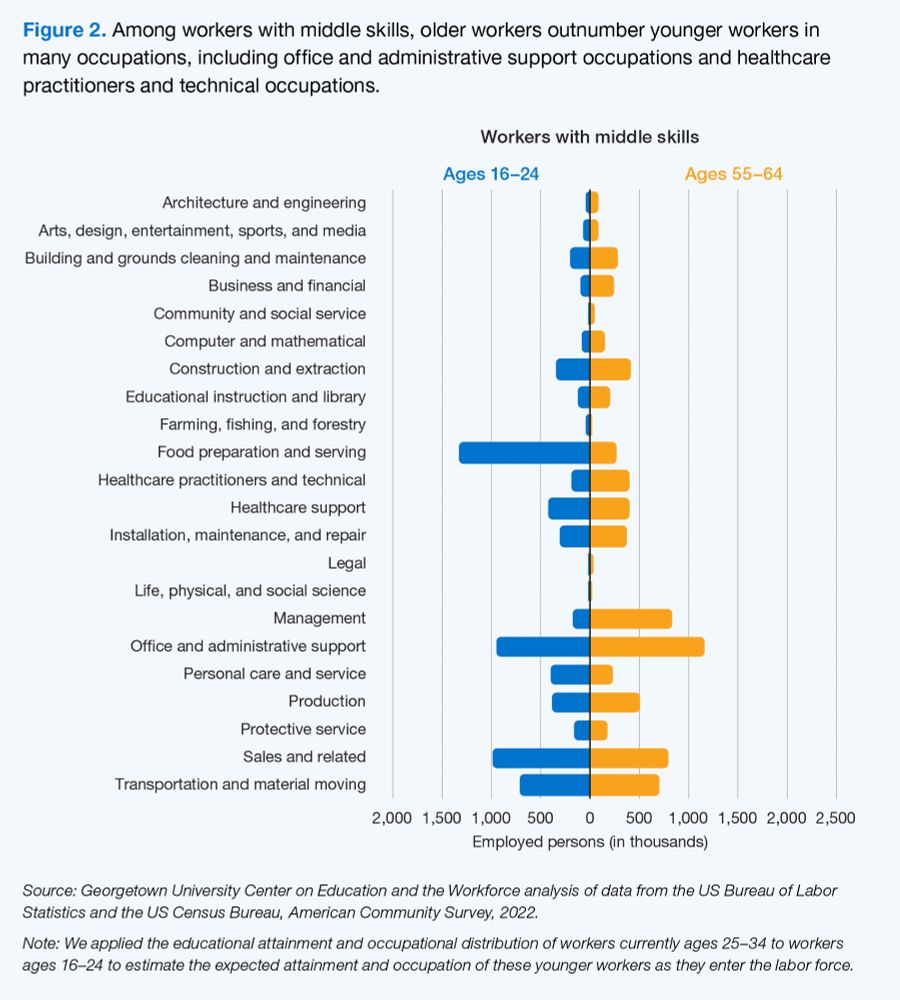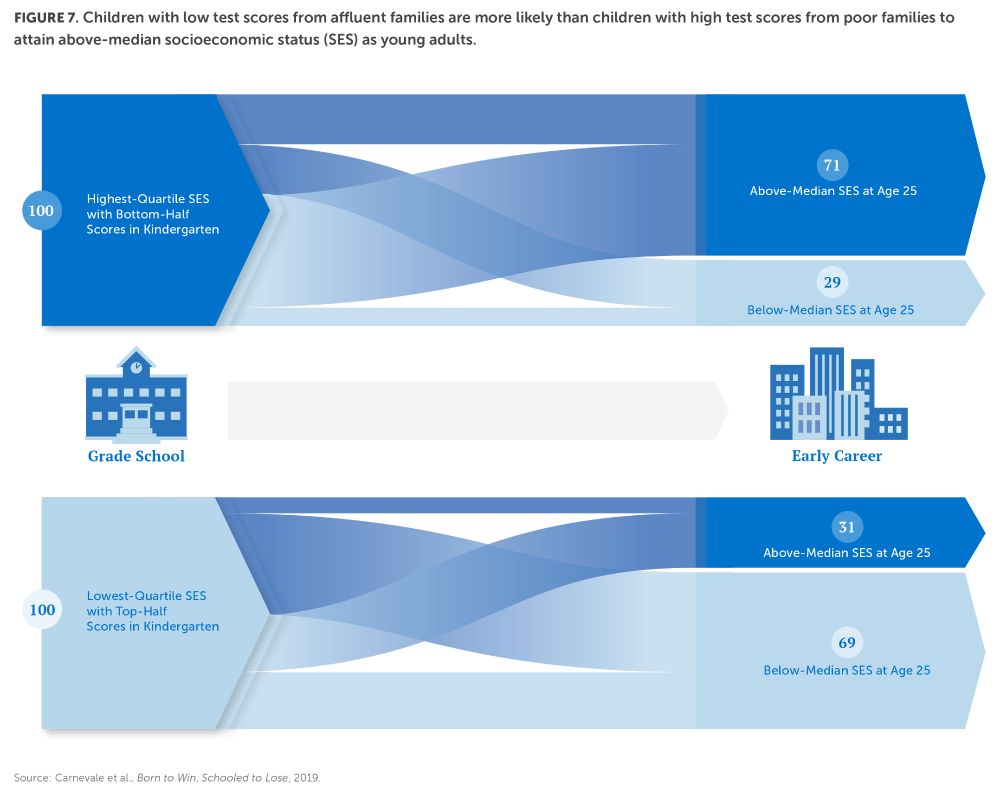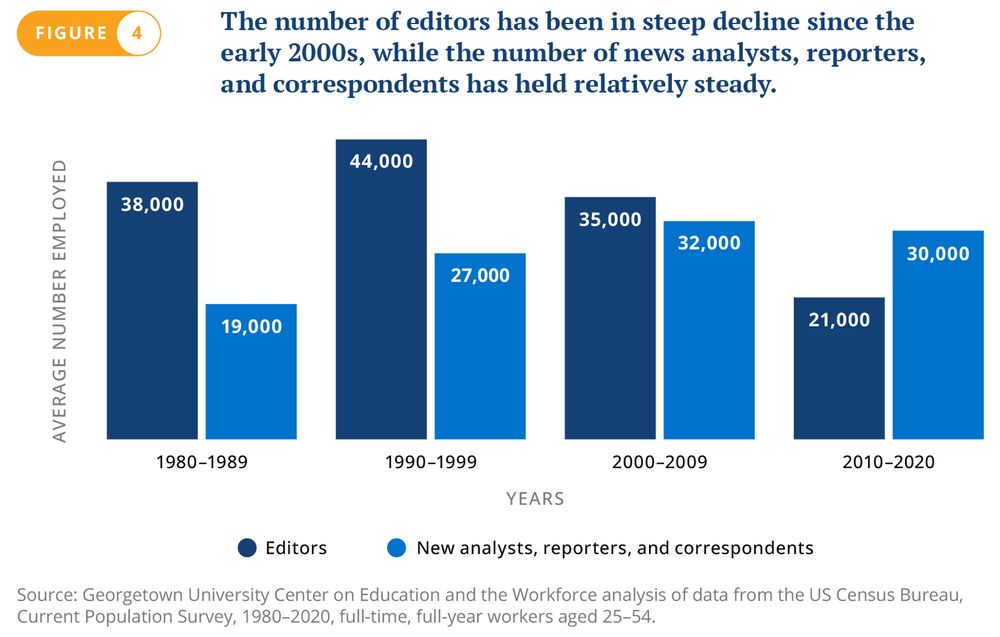
Georgetown CEW
@georgetowncew.bsky.social
The Georgetown University Center on Education and the Workforce (CEW) is a research and policy institute within Georgetown’s McCourt School of Public Policy.
Disparities in degree attainment matter because the differences in earnings by degree level are substantial. However, even when adults from marginalized racial/ethnic groups reach the same levels of attainment as white adults, they do not garner the same earnings. bit.ly/4aOgi7F
#AcademicSky
#AcademicSky

November 3, 2025 at 6:32 PM
Disparities in degree attainment matter because the differences in earnings by degree level are substantial. However, even when adults from marginalized racial/ethnic groups reach the same levels of attainment as white adults, they do not garner the same earnings. bit.ly/4aOgi7F
#AcademicSky
#AcademicSky
Despite numeric increases in enrollment, the shares of American Indian/Alaska Native, Black/African American, and Hispanic/Latino students who attend a selective institution are still disproportionately small. bit.ly/3JoPdvi
#AcademicSky #EduSky
#AcademicSky #EduSky

October 31, 2025 at 2:34 PM
Despite numeric increases in enrollment, the shares of American Indian/Alaska Native, Black/African American, and Hispanic/Latino students who attend a selective institution are still disproportionately small. bit.ly/3JoPdvi
#AcademicSky #EduSky
#AcademicSky #EduSky
“A small number of selective colleges are launchpads to positions of influence, but these institutions remain highly segregated. This chasm of inequity undermines the goal of the American postsecondary system.”—CEW Director Jeff Strohl. bit.ly/3JoPdvi
#AcademicSky #HigherEd #EduSky
#AcademicSky #HigherEd #EduSky

October 28, 2025 at 2:03 PM
“A small number of selective colleges are launchpads to positions of influence, but these institutions remain highly segregated. This chasm of inequity undermines the goal of the American postsecondary system.”—CEW Director Jeff Strohl. bit.ly/3JoPdvi
#AcademicSky #HigherEd #EduSky
#AcademicSky #HigherEd #EduSky
Men are overrepresented in the STEM fields of study compared to their overall share of the bachelor’s degree–holding workforce, while women are overrepresented in the healthcare and education and public service fields. bit.ly/4grhO2Y
#STEM #Gender #Workforce #AcademicSky
#STEM #Gender #Workforce #AcademicSky

October 24, 2025 at 3:07 PM
Men are overrepresented in the STEM fields of study compared to their overall share of the bachelor’s degree–holding workforce, while women are overrepresented in the healthcare and education and public service fields. bit.ly/4grhO2Y
#STEM #Gender #Workforce #AcademicSky
#STEM #Gender #Workforce #AcademicSky
Workers w/ bachelor’s degrees in multidisciplinary studies benefit the most from earning a graduate degree, with a 40% increase in earnings. Workers w/ bachelor’s degrees in business and communications fields see lower graduate degree earnings premiums. bit.ly/4grhO2Y
#ROI #Earnings #AcademicSky
#ROI #Earnings #AcademicSky

October 23, 2025 at 2:11 PM
Workers w/ bachelor’s degrees in multidisciplinary studies benefit the most from earning a graduate degree, with a 40% increase in earnings. Workers w/ bachelor’s degrees in business and communications fields see lower graduate degree earnings premiums. bit.ly/4grhO2Y
#ROI #Earnings #AcademicSky
#ROI #Earnings #AcademicSky
In 2022, 28% of early-career workers with a bachelor’s degree majored in STEM, up from 19% in 2010. Meanwhile, the share of early-career workers with a bachelor’s degree in humanities and the arts fell from 13% to 9%. bit.ly/4grhO2Y
#STEM #AcademicSky #ROI
#STEM #AcademicSky #ROI

October 22, 2025 at 6:00 PM
In 2022, 28% of early-career workers with a bachelor’s degree majored in STEM, up from 19% in 2010. Meanwhile, the share of early-career workers with a bachelor’s degree in humanities and the arts fell from 13% to 9%. bit.ly/4grhO2Y
#STEM #AcademicSky #ROI
#STEM #AcademicSky #ROI
“The number of students graduating with degrees in computers, statistics, and mathematics ballooned by 159% between 2009 and 2023, but unemployment rates for recent college grads with degrees in these fields is now 6.8%—the highest within STEM.”—Ban Cheah. bit.ly/4grhO2Y
#STEM #Unemployment
#STEM #Unemployment

October 21, 2025 at 8:15 PM
“The number of students graduating with degrees in computers, statistics, and mathematics ballooned by 159% between 2009 and 2023, but unemployment rates for recent college grads with degrees in these fields is now 6.8%—the highest within STEM.”—Ban Cheah. bit.ly/4grhO2Y
#STEM #Unemployment
#STEM #Unemployment
“Choosing a major has long been one of the most consequential decisions that college students make. This is particularly true now, when recent college grads are facing a rocky labor market. Students need to weigh options carefully,” said Catherine Morris. bit.ly/4grhO2Y
#CollegeMajor #ROI #HigherEd
#CollegeMajor #ROI #HigherEd

October 20, 2025 at 6:27 PM
“Choosing a major has long been one of the most consequential decisions that college students make. This is particularly true now, when recent college grads are facing a rocky labor market. Students need to weigh options carefully,” said Catherine Morris. bit.ly/4grhO2Y
#CollegeMajor #ROI #HigherEd
#CollegeMajor #ROI #HigherEd
Early-career earnings are not always indicative of how much graduates might expect to earn, but they can be meaningful, in some cases setting the tone for the rest of graduates’ careers and affecting their lifelong earnings potential. bit.ly/4grhO2Y
#Workforce #Economy #AcademicSky
#Workforce #Economy #AcademicSky

October 17, 2025 at 5:15 PM
Early-career earnings are not always indicative of how much graduates might expect to earn, but they can be meaningful, in some cases setting the tone for the rest of graduates’ careers and affecting their lifelong earnings potential. bit.ly/4grhO2Y
#Workforce #Economy #AcademicSky
#Workforce #Economy #AcademicSky
Even after decades of reform, the American education system has a growing problem with racial and economic injustice. More White (46%) and Asian (64%) adults have an associate’s degree or higher, compared to 21% of Latino adults and 31% of Black adults. bit.ly/3vvrroz
#AcademicSky #Education
#AcademicSky #Education

October 14, 2025 at 2:08 PM
Even after decades of reform, the American education system has a growing problem with racial and economic injustice. More White (46%) and Asian (64%) adults have an associate’s degree or higher, compared to 21% of Latino adults and 31% of Black adults. bit.ly/3vvrroz
#AcademicSky #Education
#AcademicSky #Education
Workers in education- and care-related occupations play essential roles by caring for young children and enabling parents to remain in the workforce. We need to incentivize workers to enter these occupations to address projected skills shortages. bit.ly/47470EL

October 3, 2025 at 3:02 PM
Workers in education- and care-related occupations play essential roles by caring for young children and enabling parents to remain in the workforce. We need to incentivize workers to enter these occupations to address projected skills shortages. bit.ly/47470EL
“Without massive and immediate increases in educational attainment, 171 occupations of the 561 we analyzed will face skills shortages through 2032,” said CEW’s Nicole Smith, lead author of our new report. Read more: bit.ly/4oHclst
#Education #EduSky #AcademicSky
#Education #EduSky #AcademicSky

September 30, 2025 at 2:15 PM
“Without massive and immediate increases in educational attainment, 171 occupations of the 561 we analyzed will face skills shortages through 2032,” said CEW’s Nicole Smith, lead author of our new report. Read more: bit.ly/4oHclst
#Education #EduSky #AcademicSky
#Education #EduSky #AcademicSky
“Addressing the skills gap will require teaching and counseling strategies that are adaptable and responsive to the evolving socioeconomic and racial/ethnic demographics of our classrooms.”—CEW Director Jeff Strohl: bit.ly/4oHclst
#AcademicSk#AcademicSkyhref="/hashtag/Skills" class="hover:underline text-blue-600 dark:text-sky-400 no-card-link">#Skills
#AcademicSk#AcademicSkyhref="/hashtag/Skills" class="hover:underline text-blue-600 dark:text-sky-400 no-card-link">#Skills

September 19, 2025 at 2:50 PM
“Addressing the skills gap will require teaching and counseling strategies that are adaptable and responsive to the evolving socioeconomic and racial/ethnic demographics of our classrooms.”—CEW Director Jeff Strohl: bit.ly/4oHclst
#AcademicSk#AcademicSkyhref="/hashtag/Skills" class="hover:underline text-blue-600 dark:text-sky-400 no-card-link">#Skills
#AcademicSk#AcademicSkyhref="/hashtag/Skills" class="hover:underline text-blue-600 dark:text-sky-400 no-card-link">#Skills
Among workers with a high school diploma or less, there are far more older workers than younger workers in occupations such as construction and extraction. bit.ly/4oHclst
#AcademicSk#AcademicSky
#AcademicSk#AcademicSky

September 18, 2025 at 3:57 PM
Among workers with a high school diploma or less, there are far more older workers than younger workers in occupations such as construction and extraction. bit.ly/4oHclst
#AcademicSk#AcademicSky
#AcademicSk#AcademicSky
At the middle-skills level, there is an insufficient supply of younger workers to replace the older workers anticipated to retire from occupations such as office and administrative support and healthcare practitioners and technical occupations. bit.ly/4oHclst
#Economy #Workforce #AcademicSky
#Economy #Workforce #AcademicSky

September 16, 2025 at 5:12 PM
At the middle-skills level, there is an insufficient supply of younger workers to replace the older workers anticipated to retire from occupations such as office and administrative support and healthcare practitioners and technical occupations. bit.ly/4oHclst
#Economy #Workforce #AcademicSky
#Economy #Workforce #AcademicSky
The slow journey to good jobs has consequences for young people’s financial well-being. Although today’s young adults are more likely to have good jobs from age 30 onward, they are still less financially secure than young adults of the previous generation. bit.ly/39mn6ye
#AcademicSky #Economy
#AcademicSky #Economy


September 12, 2025 at 2:33 PM
The slow journey to good jobs has consequences for young people’s financial well-being. Although today’s young adults are more likely to have good jobs from age 30 onward, they are still less financially secure than young adults of the previous generation. bit.ly/39mn6ye
#AcademicSky #Economy
#AcademicSky #Economy
Debt functions as a negative balance against wealth: any money that young people use to pay off loans is money they can’t save or invest. Those without educational debt in their 20s are able to save substantially more money as young adults: bit.ly/39mn6ye
#StudentDebt #AcademicSky
#StudentDebt #AcademicSky

September 10, 2025 at 5:41 PM
Debt functions as a negative balance against wealth: any money that young people use to pay off loans is money they can’t save or invest. Those without educational debt in their 20s are able to save substantially more money as young adults: bit.ly/39mn6ye
#StudentDebt #AcademicSky
#StudentDebt #AcademicSky
Graduate school debt varies by field of study: graduate program completers in the healthcare field are more likely to take out debt than those in other fields. They hold the most debt at the median, well above the overall median across all fields of study. bit.ly/3NaFnzn
#GradSchool #StudentDebt
#GradSchool #StudentDebt

September 5, 2025 at 3:08 PM
Graduate school debt varies by field of study: graduate program completers in the healthcare field are more likely to take out debt than those in other fields. They hold the most debt at the median, well above the overall median across all fields of study. bit.ly/3NaFnzn
#GradSchool #StudentDebt
#GradSchool #StudentDebt
In 1983, 8% of all jobs were held by workers with graduate degrees; by 2021, that share had nearly doubled, to 14%. We expect demand for workers with graduate degrees to increase further into the next decade, reaching 16% by 2031. bit.ly/3NaFnzn

September 3, 2025 at 5:35 PM
In 1983, 8% of all jobs were held by workers with graduate degrees; by 2021, that share had nearly doubled, to 14%. We expect demand for workers with graduate degrees to increase further into the next decade, reaching 16% by 2031. bit.ly/3NaFnzn
The current education-to-workforce pipeline is fraught with class and racial inequalities. These disparities in the education and training pipeline have a major impact on inequities in the workforce. bit.ly/3FMGRdR
#Workforce #Economy #AcademicSky
#Workforce #Economy #AcademicSky

August 29, 2025 at 5:43 PM
The current education-to-workforce pipeline is fraught with class and racial inequalities. These disparities in the education and training pipeline have a major impact on inequities in the workforce. bit.ly/3FMGRdR
#Workforce #Economy #AcademicSky
#Workforce #Economy #AcademicSky
Young people have been hit particularly hard in the three recessions since the turn of the millennium, and the share of youth ages 16 to 21 who are working is now 14 percentage points lower than it was in 2000. bit.ly/3FMGRdR

August 27, 2025 at 6:00 PM
Young people have been hit particularly hard in the three recessions since the turn of the millennium, and the share of youth ages 16 to 21 who are working is now 14 percentage points lower than it was in 2000. bit.ly/3FMGRdR
Cost has become a substantial barrier for young people who wish to pursue a degree or credential. It used to be possible to work one’s way through college; today, college costs are too high—and young people’s wages too low—for that to be feasible. bit.ly/3FMGRdR
#College #AcademicSky #Economy
#College #AcademicSky #Economy

August 25, 2025 at 5:51 PM
Cost has become a substantial barrier for young people who wish to pursue a degree or credential. It used to be possible to work one’s way through college; today, college costs are too high—and young people’s wages too low—for that to be feasible. bit.ly/3FMGRdR
#College #AcademicSky #Economy
#College #AcademicSky #Economy
Gaps in the potential to accumulate savings over workers’ careers would shrink or even be reversed with more equal educational attainment. Learn more: bit.ly/3vvrroz
#AcademicSky #Workforce #Earnings
#AcademicSky #Workforce #Earnings

August 7, 2025 at 7:18 PM
Gaps in the potential to accumulate savings over workers’ careers would shrink or even be reversed with more equal educational attainment. Learn more: bit.ly/3vvrroz
#AcademicSky #Workforce #Earnings
#AcademicSky #Workforce #Earnings
Even after decades of reform, the American education system has a growing problem with racial and economic injustice. More White (46%) and Asian (64%) adults have an associate’s degree or higher, compared to 21% of Latino adults and 31% of Black adults. bit.ly/3vvrroz
#AcademicSky #EduSky
#AcademicSky #EduSky

August 5, 2025 at 1:55 PM
Even after decades of reform, the American education system has a growing problem with racial and economic injustice. More White (46%) and Asian (64%) adults have an associate’s degree or higher, compared to 21% of Latino adults and 31% of Black adults. bit.ly/3vvrroz
#AcademicSky #EduSky
#AcademicSky #EduSky
Journalists are now more likely to be reporters than editors: there were three reporters for every two editors in the 2010s, compared to two editors for every reporter in the 1980s. #StopthePresses bit.ly/3H5krrt

August 1, 2025 at 8:03 PM
Journalists are now more likely to be reporters than editors: there were three reporters for every two editors in the 2010s, compared to two editors for every reporter in the 1980s. #StopthePresses bit.ly/3H5krrt

